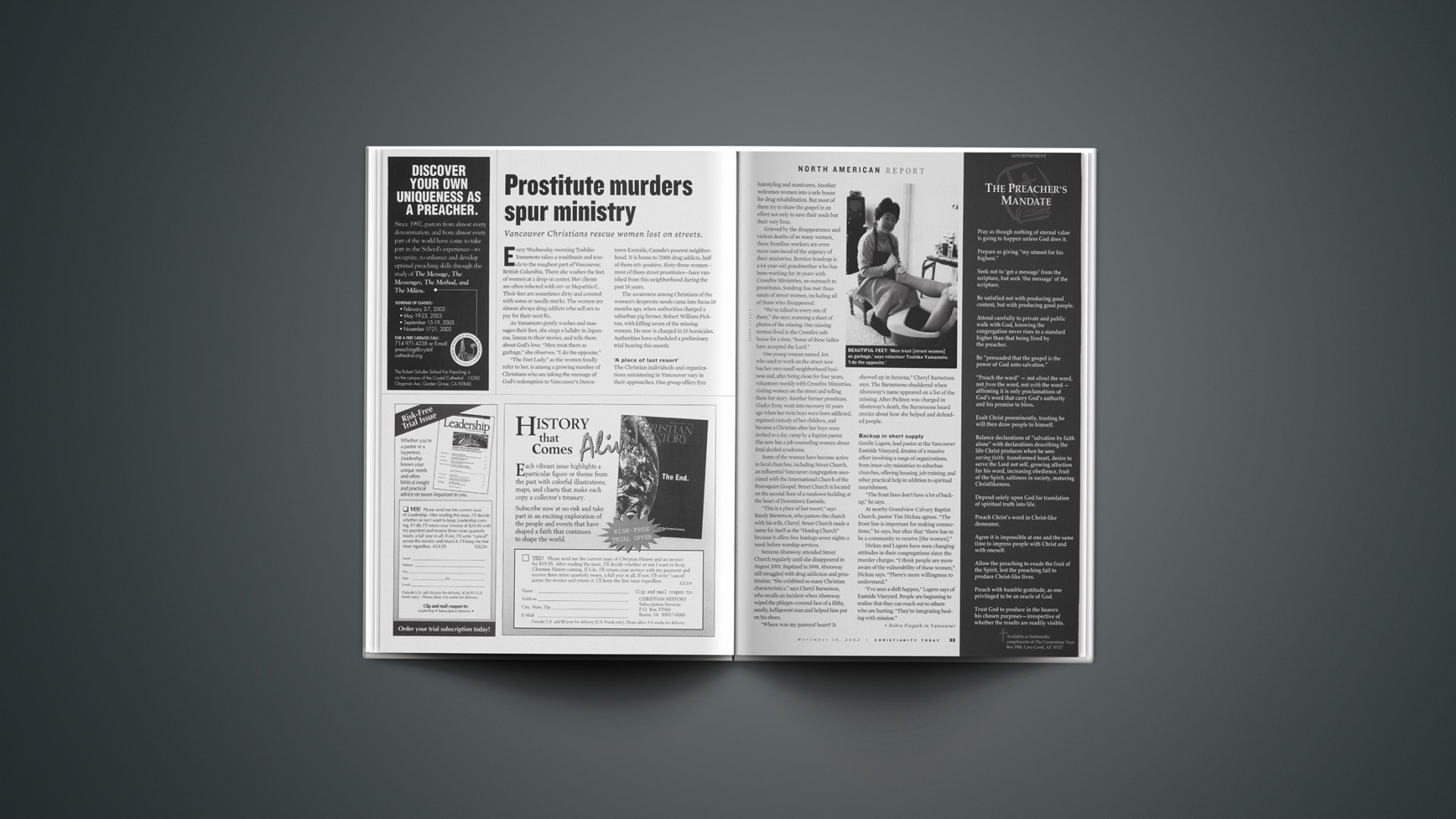Every Wednesday morning Toshiko Yamamoto takes a washbasin and towels to the roughest part of Vancouver, British Columbia. There she washes the feet of women at a drop-in center. Her clients are often infected with HIV or Hepatitis C. Their feet are sometimes dirty and covered with sores or needle marks. The women are almost always drug addicts who sell sex to pay for their next fix.
As Yamamoto gently washes and massages their feet, she sings a lullaby in Japanese, listens to their stories, and tells them about God’s love. “Men treat them as garbage,” she observes. “I do the opposite.”
“The Feet Lady,” as the women fondly refer to her, is among a growing number of Christians who are taking the message of God’s redemption to Vancouver’s Downtown Eastside, Canada’s poorest neighborhood. It is home to 7,000 drug addicts, half of them HIV-positive. Sixty-three women—most of them street prostitutes—have vanished from this neighborhood during the past 18 years.
The awareness among Christians of the women’s desperate needs came into focus 10 months ago, when authorities charged a suburban pig farmer, Robert William Pickton, with killing seven of the missing women. He now is charged in 15 homicides. Authorities have scheduled a preliminary trial hearing this month.
‘A place of last resort’
The Christian individuals and organizations ministering in Vancouver vary in their approaches. One group offers free hairstyling and manicures. Another welcomes women into a safe house for drug rehabilitation. But most of them try to share the gospel in an effort not only to save their souls but their very lives.
Grieved by the disappearance and violent deaths of so many women, these frontline workers are even more convinced of the urgency of their ministries. Bernice Sondrup is a 64-year-old grandmother who has been working for 16 years with Crossfire Ministries, an outreach to prostitutes. Sondrup has met thousands of street women, including all of those who disappeared.
“We’ve talked to every one of them,” she says, scanning a sheet of photos of the missing. One missing woman lived in the Crossfire safe house for a time. “Some of these ladies have accepted the Lord.”
One young woman named Jen who used to work on the street now has her own small neighborhood business and, after being clean for four years, volunteers weekly with Crossfire Ministries, visiting women on the street and telling them her story. Another former prostitute, Gladys Evoy, went into recovery 10 years ago when her twin boys were born addicted, regained custody of her children, and became a Christian after her boys were invited to a day camp by a Baptist pastor. She now has a job counseling women about fetal alcohol syndrome.
Some of the women have become active in local churches, including Street Church, an influential Vancouver congregation associated with the International Church of the Foursquare Gospel. Street Church is located on the second floor of a rundown building at the heart of Downtown Eastside.
“This is a place of last resort,” says Randy Barnetson, who pastors the church with his wife, Cheryl. Street Church made a name for itself as the “Hotdog Church” because it offers free hotdogs seven nights a week before worship services.
Sereena Abotsway attended Street Church regularly until she disappeared in August 2001. Baptized in 1998, Abotsway still struggled with drug addiction and prostitution. “She exhibited so many Christian characteristics,” says Cheryl Barnetson, who recalls an incident when Abotsway wiped the phlegm-covered face of a filthy, smelly, belligerent man and helped him put on his shoes.
“Where was my pastoral heart? It showed up in Sereena,” Cheryl Barnetson says. The Barnetsons shuddered when Abotsway’s name appeared on a list of the missing. After Pickton was charged in Abotsway’s death, the Barnetsons heard stories about how she helped and defended people.
Backup in short supply
Gordie Lagore, lead pastor at the Vancouver Eastside Vineyard, dreams of a massive effort involving a range of organizations, from inner-city ministries to suburban churches, offering housing, job training, and other practical help in addition to spiritual nourishment.
“The front lines don’t have a lot of backup,” he says.
At nearby Grandview Calvary Baptist Church, pastor Tim Dickau agrees. “The front line is important for making connections,” he says, but after that “there has to be a community to receive [the women].”
Dickau and Lagore have seen changing attitudes in their congregations since the murder charges. “I think people are more aware of the vulnerability of these women,” Dickau says. “There’s more willingness to understand.”
“I’ve seen a shift happen,” Lagore says of Eastside Vineyard. People are beginning to realize that they can reach out to others who are hurting. “They’re integrating healing with mission.”
Copyright © 2002 Christianity Today. Click for reprint information.
Related Elsewhere:
An extensive 1997 Faith Today article looked at the difficulties of ministry to prostitutes. Crossfire Ministries is one source for the piece, “Helping prostitutes in Jesus’ name.”
Christianity Today’sMissions and Ministry archive has more articles.










